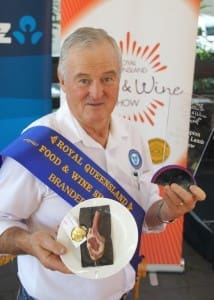A QUEENSLAND-based meat wholesale business remains in voluntary administration this week, after creditors expressed opposition to a Deed of Company Arrangement proposed during a meeting on Friday.
Melrose Wholesale Meats, headed by prominent industry identity Kerry Melrose, a former Australian Meat Industry Council national retail chairman, went into voluntary administration in August with debts totalling around $5.2 million.

Melrose Wholesale Meats principal, Kerry Melrose, with an award-winning sample of his company’s Tasmanian Royal lamb
The business was primarily involved in trading premium Tasmanian lamb under the Tasmanian Royal brand into the Queensland food service and retail market.
Much of the money owed was tied up with freight and livestock costs. Major creditors include Ruralco’s Tasmanian agency arm, Roberts, understood to be owed almost $400,000, and about $200,000 owed to Fresh Freight, a Tasmanian company that shipped carcases to Queensland for the meat supplier.
Melrose Wholesale Meats principal Kerry Melrose told Beef Central that more than half of the debts owed were internal, to family members or personal friends.
He said the primary reason for the business’s failure was because the company’s lamb supply channels out of Tasmania had disappeared.
The closure of JBS’ Devonport abattoir meant the business could no longer supply Tasmanian Royal lamb, the company’s flagship product, as alternative contract kills could not be found in Tasmania.
The only other service kill lamb abattoir at Cressy was already killing for another Queensland wholesaler, and could not accommodate the Tasmanian Royal kill, he said.
“The Tasmanian government could have done more to keep us in business, to be quite honest,” he said.
A tightening meat industry also contributed to the company’s financial position. “When you’re squeezed at both ends you run out of your ability to pay people… even though you want to,” he said.
Mr Melrose said there were still matters to be resolved before any future plans could be considered, however the business would not continue in its previous form. He said the Tasmanian Royal brand remained a well-known and respected lamb brand in the Queensland market.
He said that he and fellow investors had invested every cent they could into the business, and no funds had been extracted.
Administrator Michael Caspaney from Menzies Advisory, said a Deed of Company Arrangement had been applied for at a creditors meeting last week, which was pending.
A Deed of Company Arrangement (DOCA) is a binding arrangement between a company and its creditors governing how the company’s affairs will be dealt with, which may be agreed to as a result of the company entering voluntary administration.
“Basically it means the directors will put some money up, and that money will go towards paying secured creditors a compromised figure, rather than 100 cents in the dollar,” Mr Caspaney said. Unsecured creditors would receive nothing.
The way a DOCA worked, once the arrangement is executed, and the monies distributed, the company is then handed back to the directors, Mr Caspaney said.
However he said he had been put on notice by several unrelated company creditors that they intended to challenge the Deed of Company Arrangement through the courts. He said there were provisions within the Corporations Act for such challenges, in the event where non-related parties could prove that the reason why the DOCA was resolved was because of support for the resolution by related parties.
As a result, Mr Caspaney said he had withheld executing the Deed of Company Arrangement on Melrose Wholesale Meats. There was a three-week statutory period for complainants to exercise their rights through the courts.
Asked what the root cause of Melrose Wholesale Meats financial problems was, he said based on discussions with the principals, it was about the removal of the company’s key source of Tasmanian lamb, after an abattoir closure. “It’s a shadow of what the company used to be,” he said. “It no longer had the volume.”
Melrose Wholesale Meats move into administration became a political issue in Tasmania recently, when the state’s Labor Shadow Minister for Primary Industries Shane Broad criticised his state government, saying it had refused to listen to the concerns of Melrose Meats and others about the loss of the Devonport lamb processing facility.
He said the nationally-renowned supplier of Tasmanian lamb had gone into administration as a direct casualty of the Liberal state government’s incompetent handling of the closure of the JBS abattoir in Devonport.
“Despite the Liberals assuring Tasmanian farmers that everything is fine, Tasmania has now lost a buyer of 50,000 lambs a year due to a lack of a suitable abattoir,” Dr Broad said.
“Labor has been warning for some time that processing Tasmanian lambs in Victoria is not a sustainable solution, adds cost, and risks undermining the Tasmanian brand. Those fears have sadly been confirmed. Melrose has a proud 136 year history and has won numerous awards for its premier product, Tasmanian Royal Lamb,” he said.
